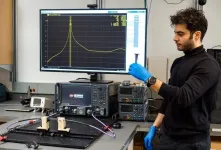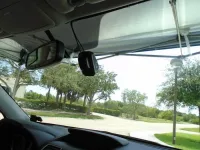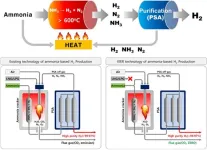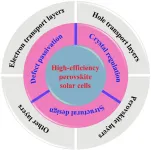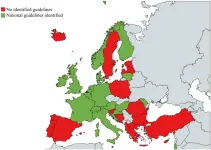(Press-News.org) PHOENIX, February 29, 2024 — Research on patient-centered treatment of head and neck cancers will be presented at the 2024 Multidisciplinary Head and Neck Cancers Symposium, which takes place in Phoenix and online today through March 2. Media registration is available via our press kit, and general registration is available via the meeting website.
Seven high-impact studies recommended by symposium leadership for media are noted below. All abstracts are available online. Experts are available to provide outside commentary and perspective on research at the meeting; contact ASTRO’s media relations team to schedule an interview.
Abstract 1: Pembrolizumab with or without lenvatinib as first-line therapy for recurrent or metastatic head and neck squamous cell carcinoma (R/M HNSCC): Phase 3 LEAP-010 study
Session: Plenary I, Thursday, February 29, 1:30 – 3:00 p.m., Mountain time
Presenter: Lisa Licitra, MD, Fondazione IRCCS Istituto Nazionale dei Tumori, University of Milan
Abstract 8: Phase I/II study of a novel MDM-2 inhibitor (APG-115-alrizomadlin) in p53 wild type salivary gland cancers
Session: Plenary I, Thursday, February 29, 1:30 – 3:00 p.m., Mountain time
Presenter: Paul L. Swiecicki, University of Michigan
Abstract LBA1: Early disease recurrence following post-operative HPV ctDNA directed active surveillance in oropharyngeal carcinoma – Outcomes of a prospective pilot study
Session: Plenary I, Thursday, February 29, 1:30 – 3:00 p.m., Mountain time
Presenter: Linda Chen, MD, Memorial Sloan Kettering Cancer Center
Abstract LBA2: Efficacy of a navigation-based intervention vs usual care for decreasing delays in starting guideline-adherent adjuvant therapy for patients with head and neck cancer
Session: Plenary II, Friday, March 1, 10:50 a.m. – 12:20 p.m., Mountain time
Presenter: Evan M. Graboyes, MD, Medical University of South Carolina
Abstract 14: Long-term efficacy of risk-directed, de-escalated post-operative adjuvant therapy for surgically resected locally advanced, human papillomavirus-positive oropharynx squamous-cell carcinoma (HPV+ OPSCC): A non-randomized, multi-arm phase 2 trial
Session: Plenary II, Friday, March 1, 10:50 a.m. – 12:20 p.m., Mountain time
Presenter: Wade L. Thorstad, MD, Washington University, St. Louis
Abstract 16: FDG-PET-based selective de-escalation of radiotherapy for HPV-related oropharynx cancer: Results from a phase II trial
Session: Plenary II, Friday, March 1, 10:50 a.m. – 12:20 p.m., Mountain time
Presenter: Samuel N. Regan, MD, University of Michigan
Abstract 17: Early outcomes for a single-arm phase I/II trial of Selective Avoidance of nodal VolumEs at minimal Risk (SAVER) in the contralateral N0 neck of patients with p16-positive oropharynx cancer
Session: Plenary II, Friday, March 1, 10:50 a.m. – 12:20 p.m., Mountain time
Presenter: Jason K. Molitoris, MD, PhD, University of Maryland
ABOUT THE SYMPOSIUM
The Multidisciplinary Head and Neck Cancers Symposium is cosponsored by the American Society for Radiation Oncology (ASTRO), the American Society of Clinical Oncology (ASCO), the American Head & Neck Society (AHNS) and the Society for Immunotherapy of Cancer (SITC). The symposium features interactive and case-based discussions that address new multidisciplinary therapies, guidelines, supportive care and disparities in the treatment of head and neck cancer. Highlighted sessions include plenaries featuring clinical trials reports and studies from medical, surgical and radiation oncologists; keynote discussions on increasing diversity in clinical trials and the evolving role of immunotherapy for head and neck cancers; and panels on topics such as new therapies for recurrent disease and improving survivorship care for patients.
ABOUT ASTRO
The American Society for Radiation Oncology (ASTRO) is the largest radiation oncology society in the world, with nearly 10,000 members who are physicians, nurses, biologists, physicists, radiation therapists, dosimetrists and other health care professionals who specialize in treating patients with radiation therapies. Radiation therapy contributes to 40% of global cancer cures, and more than a million Americans receive radiation treatments for cancer each year. For information on radiation therapy, visit RTAnswers.org. To learn more about ASTRO, visit our website and media center, and follow us on social media.
END
Noteworthy studies to be presented at the 2024 Multidisciplinary Head & Neck Cancers Symposium
2024-02-29
ELSE PRESS RELEASES FROM THIS DATE:
Turbocharging CRISPR to understand how the immune system fights cancer
2024-02-29
Over the past two decades, the immune system has attracted increasing attention for its role in fighting cancer. As researchers have learned more and more about the cancer-immune system interplay, several antitumor immunotherapies have become FDA-approved and are now regularly used to treat multiple cancer types.
Yet despite these advances, much remains unknown about how the immune system fights cancer — and about immunity in general, said Martin LaFleur, a postdoctoral fellow in the laboratory of Arlene ...
UBC Okanagan researchers create new compound to build space-age antennas
2024-02-29
In a first-of-its-kind development, UBC Okanagan researchers, in collaboration with Drexel University, have created a new compound that can be used to 3D print telecommunication antennas and other connectivity devices.
These 3D printed products, created by combining a two-dimensional compound called MXenes with a polymer, can be used as an alternative for metallic counterparts and can make a vast improvement in communication technology including elements such as antennas, waveguides and filters.
Waveguides are everywhere, yet most people don’t know what they are, says Dr. Mohammad Zarifi, a researcher in UBC Okanagan’s Microelectronics and Gigahertz ...
Study detects cognitive changes in older drivers using in-vehicle sensors
2024-02-29
An estimated 4 to 8 million older adults with mild cognitive impairment are currently driving in the United States, and one-third of them will develop dementia within five years. Individuals with progressive dementias are eventually unable to drive safely, yet many remain unaware of their cognitive decline.
Currently, screening and evaluation services for driving can only test a small number of individuals with cognitive concerns, missing many who need to know if they require treatment.
Nursing, engineering and neuropsychology researchers at Florida Atlantic University are testing and evaluating a readily and rapidly available, unobtrusive in-vehicle sensing ...
Terasaki Institute for Biomedical Innovation announces 2024 Paul Terasaki Award recipient
2024-02-29
(LOS ANGELES) – February 29, 2024 - The Terasaki Institute for Biomedical Innovation (TIBI) is pleased to announce their selection of Professor Nicholas A. Peppas of The University of Texas at Austin as the recipient of the 2024 Paul Terasaki Distinguished Scientist Innovation Award. The award will be presented at TIBI’s 2nd annual Terasaki Innovation Summit, to be held March 27-29, 2024, at the UCLA Meyer & Renee Luskin Conference Center.
The award was created in memory of Dr. Paul I. Terasaki, a pioneer in organ transplant research and innovation. It recognizes outstanding achievement in the field of biomedical ...
Terasaki Institute for Biomedical Innovation announces 2024 Hisako Terasaki Award recipients
2024-02-29
(LOS ANGELES) – February 29, 2024 - The Terasaki Institute for Biomedical Innovation (TIBI) is pleased to announce their selections of Assistant Professors Amir Manbachi of Johns Hopkins University and Ritu Raman of the Massachusetts Institute of Technology (MIT) as the recipients of the 2024 Hisako Terasaki Young Innovator Awards. The awards will be presented at TIBI’s 2nd annual Terasaki Innovation Summit, to be held March 27-29, 2024, at the UCLA Meyer & Renee Luskin Conference Center.
The award was created in memory of Hisako Terasaki, philanthropist, accomplished artist, and wife ...
Small dietary changes can cut your carbon footprint by 25%
2024-02-29
The latest Canada’s Food Guide presents a paradigm shift in nutrition advice, nixing traditional food groups, including meat and dairy, and stressing the importance of plant-based proteins. Yet, the full implications of replacing animal with plant protein foods in Canadians’ diets are unknown.
New research at McGill University in collaboration with the London School of Hygiene & Tropical Medicine provides compelling evidence that partially substituting animal with plant protein foods can increase life expectancy and decrease greenhouse gas emissions. Importantly, ...
Uncertainty in measuring biodiversity change could hinder progress towards global targets for nature
2024-02-29
More than ever before, there is a growing interest in dedicating resources to stop the loss of biodiversity, as recently exemplified by the Kunming-Montreal Global Biodiversity Framework (GBF) decided at COP15 in December 2022. The GBF focuses on understanding why biodiversity is declining and what actions are needed to reverse this trend. However, according to researchers at McGill University, implementing the plan is challenging because information about biodiversity changes is not evenly available everywhere, and is uncertain in many places.
With the available data, can the ...
Zero emissions of carbon dioxide! Successful production of ammonia-based clean hydrogen
2024-02-29
Dr. Jung Unho's research team at the Hydrogen Research Department of the Korea Institute of Energy Research (KIER) has developed Korea's first clean hydrogen production technology. This technology is based on ammonia decomposition and does not use fossil fuels. The team's breakthrough could pave the way for a more sustainable and eco-friendly energy source. This allows for the production of high-purity hydrogen that meets international standards for hydrogen-powered vehicles, without the carbon dioxide emissions produced by using fossil fuels.
Ammonia, a compound of hydrogen and nitrogen, has a hydrogen storage density 1.7 times ...
Guiding future research on ‘extraordinary potential’ of next-generation solar cells
2024-02-29
Today’s commercial solar panels can convert about 15% to 20% of the sunlight they absorb into electrical energy — but they could be much more efficient, according to researchers at Soochow University. The next generation of solar cells has already demonstrated 26.1% efficiency, they said, but more specific research directions are needed to make such efficiency the standard and expand beyond it.
They published their review of the current state of research on high-efficiency perovskite solar cells and their recommendations for future work in Energy Materials and Devices on February 4.
“Metal halide perovskite ...
Urgent need for guidelines for the care of child victims of sexual abuse
2024-02-29
Only half of 34 surveyed European countries have national guidelines on how to provide clinical care and treatment to children who have experienced sexual abuse. This finding was revealed in a study led by researchers at Barnafrid, a national knowledge centre in the field of violence and other abuse against children, at Linköping University in Sweden. The consequences for the affected children can be severe, according to the researchers.
“Our findings suggest that children in Europe may not receive equal care. From a child rights perspective, this is unacceptable. ...
